The Music of Peru is an amalgamation of sounds and styles drawing on Peru's Andean, Spanish, and African roots. Andean influences can perhaps be best heard in wind instruments and the shape of the melodies, while the African influences can be heard in the rhythm and percussion instruments, and European influences can be heard in the harmonies and stringed instruments. Pre-Columbian Andean music was played on drums and string instruments, like the European pipe and tabor tradition. Andean tritonic and pentatonic scales were elaborated during the colonial period into hexatonic, and in some cases, diatonic scales.
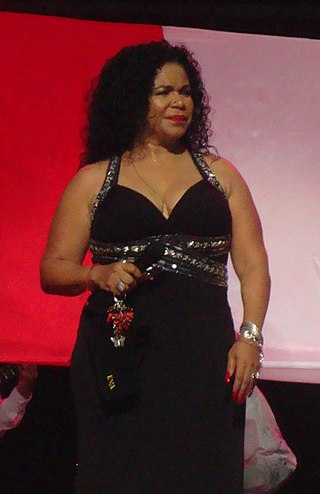
Eva María Angélica Ayllón Urbina better known by her stage name Eva Ayllón, is a female composer and singer, one of Peru's foremost Afro-Peruvian musicians, and one of the country's most enduring living legends. She held the record for most nominations without a winning the Latin Grammy Award for Best Folk Album. In 2019, she received the Latin Grammy Lifetime Achievement Award.

Mexican cumbia is a type of cumbia, a music which originated in Colombia but was later reinvented and adapted in Mexico.
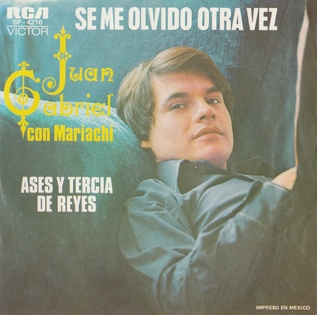
"Se Me Olvidó Otra Vez" is a song written and performed by Mexican singer-songwriter Juan Gabriel for his fourth studio album, Juan Gabriel con el Mariachi Vargas de Tecalitlán (1974). The song is a ranchera number that tells of an impossible reunion as the singer forgets he is the only one who loved a woman. It was released as the lead single from the album in 1975. The song has been listed as among Juan Gabriel's best songs according to music critics and was one of the best-performing singles of 1975 in Mexico. Gabriel has re-recorded the song twice, the first for his compilation album, Por Los Siglos (2001), and as a duet with fellow Mexican singer-songwriter Marco Antonio Solís on his 28th studio album, Los Dúo (2015).

Puerto Rican duo Wisin & Yandel has released ten studio albums, three live albums, four collaboration albums, four compilation albums, 35 singles and 48 music videos.

The Diablada, also known as the Danza de los Diablos, characterized by performers wearing masks and costumes representing the devil and other characters from pre-Columbian theology and mythology. combined with Spanish and Christian elements added during the colonial era. Many scholars have concluded that the dance is descended from the Llama llama dance in honor of the Uru god Tiw, and the Aymaran ritual to the demon Anchanchu, both originating in pre-Columbian Bolivia, though there are competing theories on the dance's origins.

Celso Piña Arvizu was a Mexican singer, composer and accordionist, mainly in the genre of cumbia, being one of the most important musicians in the style of "cumbia rebajada".
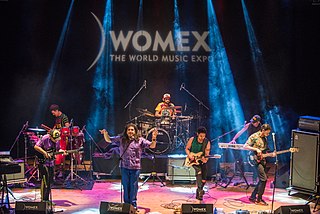
Bareto is a music group from Peru, famous for making their own versions of Peruvian Cumbia classic hits.
Combo Ginebra is a Chilean musical ensemble of the New Chilean Cumbia style. The band emerged in 2004 as a traditional gypsy music duo featuring Álvaro Pacheco and Juan Pablo Cabello. The duo soon began incorporating cumbia rhythms into their repertoire and were joined by other instrumentalists to form a cumbia ensemble band.

Pombo Musical is a children's album produced by Colombian recording artist Carlos Vives, as a musical tribute to the Colombian writer and poet Rafael Pombo. It was released on August 13, 2008, under Vives' label Gaira Música Local. The album came into fruition when Rafael Pombo Foundation president Juanita Santos asked Vives to craft a musical that uses Pombo's most iconic poems and fables he created. Its music incorporates a variety of Colombian folk genres and mixes in contemporary genres like Latin pop and pop rock. Among the 14 tracks present in the album, only one was released as a single, "El Modelo Alfabético". All the lyrics were written originally by Rafael Pombo, and produced by Vives. Pombo Musical was well-received, and was certified platinum in Colombia by the Asociación Colombiana de Productores de Fonogramas (ASINCOL). It also won some accolades, including a Latin Grammy Award for Best Latin Children's Album, and a Premio Shock for Best Compilation.
Los Acosta is a band from San Luis Potosí, Mexico.

Cumbia[ˈkumbja] is a folkloric genre and dance from Colombia.
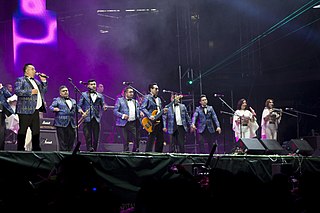
Los Ángeles Azules are a Mexican musical group that plays the cumbia sonidera genre, which is a cumbia subgenre using the accordion and synthesizers. This results in a fusion of the sounds of cumbia from the 1950-1970s with those of 1990s-style electronic music.

Enchufada is a Portuguese Independent Record Label based in Lisbon. It was founded in 2006 by Buraka Som Sistema band members Branko and Kalaf Ângelo, serving as a creative platform from which to release their early musical experiments fusing Angolan kuduro and European electronic music genres, an aesthetic that defined the early years of the imprint and set the stylistic tone for its future releases.
José Pastor López Pineda, better known as "El Indio Pastor", was a Venezuelan singer-songwriter who worked primarily in the style of Cumbia.
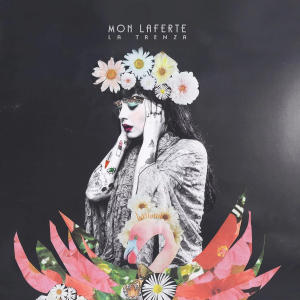
La Trenza is the fifth studio album by Chilean singer Mon Laferte, released on April 28, 2017, through Universal Music México. The album was produced by Laferte alongside Manú Jalil, and features collaborations with Enrique Bunbury, Juanes and Manuel García. A deluxe version of the album was released on November 10, 2017, with four new songs including a collaboration with Caloncho.
Cariñito is a Peruvian cumbia song written by Limeño Ángel Aníbal Rosado in 1979 and first interpreted by the Peruvian group Los Hijos del Sol. Readapted by numerous international groups and in different musical styles, the song is one of the best-known songs in the realm of Peruvian cumbia and cumbia in general.

Los Destellos were a Peruvian cumbia band formed in Lima, Peru in 1966 by Enrique Delgado Montes.

"Hasta los Dientes" is a song recorded by Cuban-American singer Camila Cabello, featuring vocals from Argentine singer María Becerra. It was released through Epic Records as the fourth and final single from Cabello's third studio album, Familia.














